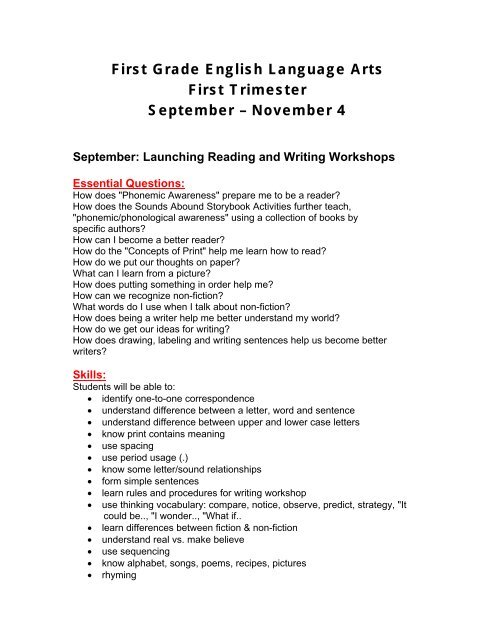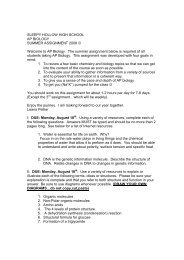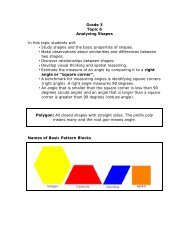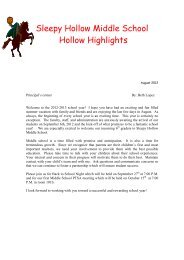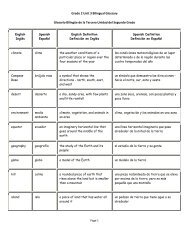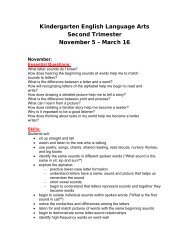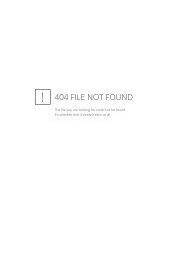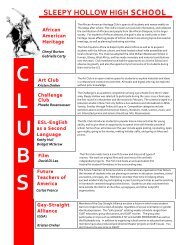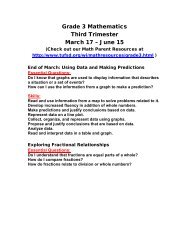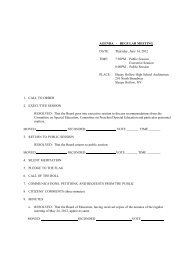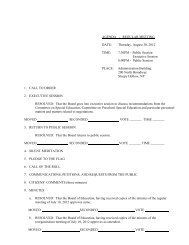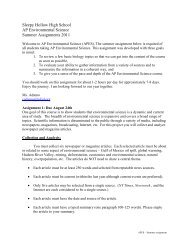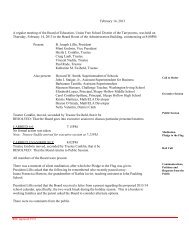First Grade English Language Arts First Trimester September ...
First Grade English Language Arts First Trimester September ...
First Grade English Language Arts First Trimester September ...
Create successful ePaper yourself
Turn your PDF publications into a flip-book with our unique Google optimized e-Paper software.
<strong>First</strong> <strong>Grade</strong> <strong>English</strong> <strong>Language</strong> <strong>Arts</strong><br />
<strong>First</strong> <strong>Trimester</strong><br />
<strong>September</strong> – November 4<br />
<strong>September</strong>: Launching Reading and Writing Workshops<br />
Essential Questions:<br />
How does "Phonemic Awareness" prepare me to be a reader?<br />
How does the Sounds Abound Storybook Activities further teach,<br />
"phonemic/phonological awareness" using a collection of books by<br />
specific authors?<br />
How can I become a better reader?<br />
How do the "Concepts of Print" help me learn how to read?<br />
How do we put our thoughts on paper?<br />
What can I learn from a picture?<br />
How does putting something in order help me?<br />
How can we recognize non-fiction?<br />
What words do I use when I talk about non-fiction?<br />
How does being a writer help me better understand my world?<br />
How do we get our ideas for writing?<br />
How does drawing, labeling and writing sentences help us become better<br />
writers?<br />
Skills:<br />
Students will be able to:<br />
• identify one-to-one correspondence<br />
• understand difference between a letter, word and sentence<br />
• understand difference between upper and lower case letters<br />
• know print contains meaning<br />
• use spacing<br />
• use period usage (.)<br />
• know some letter/sound relationships<br />
• form simple sentences<br />
• learn rules and procedures for writing workshop<br />
• use thinking vocabulary: compare, notice, observe, predict, strategy, "It<br />
could be.., "I wonder.., "What if..<br />
• learn differences between fiction & non-fiction<br />
• understand real vs. make believe<br />
• use sequencing<br />
• know alphabet, songs, poems, recipes, pictures<br />
• rhyming
• interactive read alouds (shared reading) i.e. big books, trade books<br />
• morning message<br />
• guided reading lessons<br />
• listen to poetry<br />
• use interactive charts<br />
• gather and record ideas for writing<br />
• sketch and/or write to tell a story<br />
• revise to add details and ensure sketch/writing match<br />
• edit writing for periods and spacing<br />
• Use Reading Strategies:<br />
- "Use your pointing finger to keep your place"<br />
- "Look at the picture for clues"<br />
- "Get your mouth ready for the first sound"<br />
October: Becoming an Independent Reader & Personal<br />
Narrative Writer<br />
Essential Questions:<br />
How does "word study" help me learn to read and write?<br />
What can I learn from print?<br />
How does the 5 Finger Retell help me remember what I read?<br />
How does the 5 Finger Retell help me remember what was read to me?<br />
What does adding "s" at the end of a noun or "naming word" do?<br />
How does doing a "Reading Response" help me share my thoughts about<br />
a book?<br />
How does recognizing blends and digraphs help me become a better<br />
reader?<br />
How does writing a "Personal Narrative" help me become a better<br />
writer?<br />
How does listening to "author's craft" influence our writing?<br />
How does "Phonemic Awareness" prepare me to be a reader?<br />
Skills<br />
Students will be able to:<br />
• participate in interactive read alouds (Shared Reading) i.e. big books,<br />
trade books<br />
• enjoy poetry<br />
• use interactive charts<br />
• identify rhyming sounds<br />
• use word wall<br />
• identify onsets and rimes<br />
• "Make & Break" - "How words work"<br />
• take "High Frequency" words to memory<br />
• use some letter/sound relationships, mostly beginning consonants
• "Use your pointing finger to keep your place"<br />
• "Look at the picture for clues"<br />
• "Get your mouth ready for the first sound"<br />
• identify main characters<br />
• do 5 Finger Retell<br />
• form simple sentences<br />
• begin each sentence with a capital letter<br />
• end each sentence with a punctuation mark (.)period<br />
• put a space between each word<br />
• ask "Does what I have written make sense?" (complete thought)<br />
• reread written work & use your pointing finger<br />
• write a reading response<br />
• use fiction vocabulary: real, make believe<br />
• use non-fiction vocabulary: fact, information, bold print, bullets<br />
• find personal topics to write about<br />
• write small moment stories and make attempts at a developed plot, setting<br />
and characters<br />
• revise writing for accuracy and to add details<br />
• use an editing checklist to edit their writing (capital/lowercase, spacing,<br />
periods)<br />
• make a connection text to self


